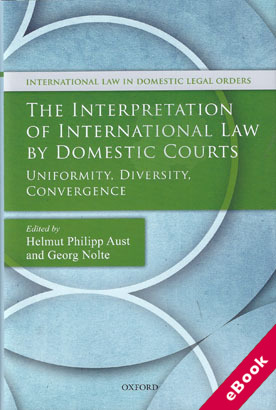
The device(s) you use to access the eBook content must be authorized with an Adobe ID before you download the product otherwise it will fail to register correctly.
For further information see https://www.wildy.com/ebook-formats
Once the order is confirmed an automated e-mail will be sent to you to allow you to download the eBook.
All eBooks are supplied firm sale and cannot be returned. If you believe there is a fault with your eBook then contact us on ebooks@wildy.com and we will help in resolving the issue. This does not affect your statutory rights.
The Interpretation of International Law by Domestic Courts assesses the growing role of domestic courts in the interpretation of international law.
It asks whether and if so to what extent domestic courts make use of the international rules of interpretation set forth in the Vienna Convention on the Law of Treaties. Given the expectation that rules of international law are to have a uniform interpretation and application throughout the world, the practice of domestic courts is considerably more diverse.
The contributions to this book analyse three key questions: first, whether international law requires a coherent interpretive approach by domestic courts. Second, whether a common or convergent methodological outlook can be found in domestic court practice. Third, whether a common interpretive approach is desirable from a normative perspective. The book identfies a considerable tension between international law's ambition for universal and uniform application and a plurality of different approaches. This tension between unity and diversity is analysed by a group of leading international lawyers from a wide range of geographical, disciplinary and methodological approaches.
Drawing on domestic practice of number of jurisdictions including, among others, Colombia, France, Japan, India, Israel, Mexico, South Africa, the United Kingdom and the United States, the book puts the interpretative practice of domestic courts in a wider context. Its chapters offer doctrinal, practical as well as theoretical perspectives on a central question for international law.